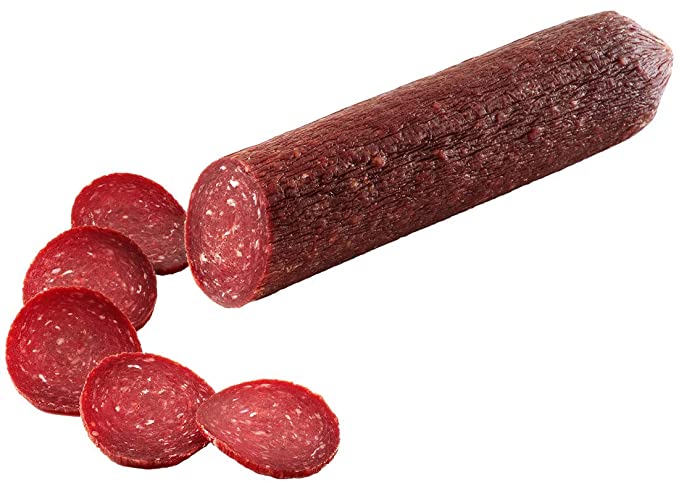Your cat maybe your best friend, but that doesn’t mean you can share all your food with your pet. Some human foods may be quite dangerous for cats, and you wouldn’t want to put your cats at risk unintentionally, would you? Before understanding whether cats can eat certain foods or not, please note that they have a very different digestive system than that of humans.
Since they are extremely light-bodied animals, they have a sensitive digestive system that cannot digest many human foods. They are obligate carnivores, but that doesn’t mean that their body can accept all meat and meat-based foods. This brings us to the main issue that we will speak about in this article – can cats eat salami?
Salami is a cured meat, usually made from pork, or a combination of pork and beef. Cats can eat salami, but in very minimal quantity only. Salami is not natural meat, and it doesn’t contain anything nutritional for cats. Since it is fermented and cured, it also contains a lot of sodium, making it unhealthy for cats. Another problem with salami is that it is cooked with some other toxic ingredients like onion and garlic, which can cause a lot of problems to cats, even if ingested in small quantities.
So, while cats can consume a couple of salami pieces occasionally, we feel there is absolutely no need to feed them this type of meat. Instead, you can give many other healthy and easily digestible treats for your cats, to keep them healthy and safe throughout their lifespan. Please keep reading to know more about why salami is bad for cats and the health risks associated with this type of meat.
Is it okay to feed salami to cats?

The digestive system of cats is equipped to handle only natural and fresh meats. Salami is prepared by curing, fermenting, and air-drying meat. Therefore, there are high chances for the meat to be contaminated. There have been cases where Salmonella, Trichinellosis, and other parasites have been identified in salami.
While Salmonella disease is more common in humans, you cannot rule out the other parasitic infections that salami can spread in cats. This meat comes with quite a few potential health risks, which are not worth taking at all. It is definitely not okay to feed salami to cats, as it has the risk of parasitic presence, and it is also rich in salt and fats.
Health risks associated with feeding salami to cats
Though we told you that you could feed salami to cats occasionally, it is definitely not required at all. Your cats are not missing anything if they don’t get some salami treats from you. Here, we present you with some of the health risks that you will make your cats prone to if you give them salami. After reading this, we are sure you will change your mind about giving salami treats to your feline friends.
Salmonella
Though salmonella infection in cats is not as high as in humans, it is still a potential health risk you should know about before feeding salami to cats. When the meat itself has this parasitic infection, it is likely to be passed on to cats as well. If your cats exhibit symptoms, such as vomiting, diarrhea, dehydration, fever, loss of appetite, and lethargy after eating salami, you have to visit the vet without any delay.
High risk for pregnant cats and kittens

Pregnant cats
When we say that you can give salami to cats occasionally, we only mean that you can feed salami to adult cats that are not pregnant. Uncooked and cured meat, like salami, can cause severe health issues in pregnant cats. Some of these issues include:
Septicemia
This condition is also known as blood poisoning or septic fever. Here, the bacterial infection spreads across the blood of cats and affects the internal organs. Miscarriage is inevitable when pregnant cats are diagnosed with septicemia.
Endotoxemia
The bacterial infections in salami can release life-threatening toxins into the blood of the cats and can cause an accumulation of toxins in the body, in this condition.
Both these conditions are very serious, and they lead to brain fever and pneumonia in pregnant cats.
Kittens
Kittens have a very delicate digestive system, far more sensitive than that of adult cats. The bacteria present in salami can cause severe damage to the young one’s digestive tract. You should give salami to kittens occasionally, only after getting approval from the vet to do so.
Sodium toxicity
Like any other cured meat, salami is rich in sodium. While cats are equipped to handle slightly high sodium levels than they are allowed, they shouldn’t be given a lot of sodium over a long time. This can lead to a condition called sodium toxicity of salt toxicity. When they eat sodium-rich foods like salami, cats should be encouraged to drink a lot of water.
However, their innate digestive system is such that it doesn’t accept too much water. As a result, sodium toxicity leads to dehydration in cats. Some of the other symptoms of this condition include swelling of the legs, excessive thirst, increased urge to urinate, imbalance in movements, lethargy, and damage to the kidneys, in severe cases. If your felines have already been diagnosed with an existing kidney-related or renal-related ailment, it is highly recommended that you keep them completely away from salami.
Feline obesity
Salami is essentially a curated sausage. Therefore, it is quite rich in fats. Overconsumption of fat-rich foods like these will lead to feline obesity. When cats become obese, it increases their risk of severe ailments like arthritis, heart-related problems, diabetes, increased blood pressure, etc.
Final Word
Salami is cured, fermented, and air-dried meat. Therefore, it doesn’t contain any nutritional benefits for cats. While they can nibble on one or two pieces of salami at times, there is absolutely no need for cats to eat salami. Also, the high sodium and fat content in salami, make it a strict no-no for cats. Never feed salami to pregnant cats and kittens, as the health risks are quite severe. In short, keep your cats safe & healthy, by keeping them as far as possible from salami.
